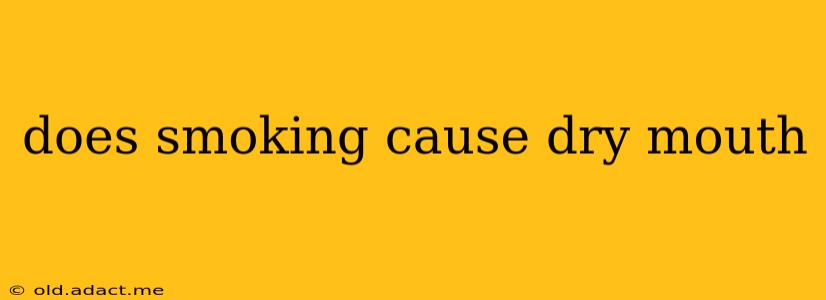Smoking is undeniably detrimental to your health, impacting numerous bodily systems. One often-overlooked consequence is dry mouth, a condition also known as xerostomia. But how exactly does smoking contribute to this uncomfortable and potentially problematic issue? Let's delve into the science behind this connection.
How Does Smoking Lead to Dry Mouth?
Smoking's link to dry mouth is multifaceted. The primary culprit is nicotine, the highly addictive substance in tobacco. Nicotine acts as a stimulant, affecting the salivary glands' ability to produce saliva. Reduced saliva flow directly translates to dry mouth. Beyond nicotine, the other chemicals and irritants in tobacco smoke further contribute to this effect.
-
Nicotine's impact on salivary glands: Nicotine disrupts the normal function of the salivary glands, hindering their ability to produce the necessary amount of saliva to keep your mouth moist. This disruption can be both short-term, occurring immediately after smoking, and long-term, developing into a persistent dry mouth condition.
-
Irritating chemicals: The numerous toxins and irritants in cigarette smoke directly damage the delicate tissues of the mouth and salivary glands. This damage further compromises the glands' capacity to produce saliva, exacerbating dry mouth.
-
Dehydration: Smoking often leads to dehydration, as nicotine is a diuretic, increasing urine production. This dehydration contributes to dry mouth by reducing the overall fluid available for saliva production.
What are the Symptoms of Dry Mouth Caused by Smoking?
The symptoms of dry mouth are fairly straightforward, though their severity varies depending on the individual and the extent of their smoking habit. Common symptoms include:
- Persistent dry feeling in the mouth: This is the most noticeable and defining symptom.
- Difficulty swallowing: Reduced saliva makes it harder to lubricate food for swallowing.
- Thick, sticky saliva: The saliva produced may be less in quantity and thicker in consistency.
- Burning or stinging sensation in the mouth: This can be particularly uncomfortable.
- Cracked lips and a sore throat: The lack of moisture affects the entire oral cavity.
- Increased risk of cavities and gum disease: Saliva plays a crucial role in protecting teeth and gums from bacteria. Reduced saliva flow significantly increases the risk of oral infections.
Can Quitting Smoking Relieve Dry Mouth?
The good news is that quitting smoking is often followed by significant improvement in dry mouth symptoms. As the body recovers from the effects of nicotine and other toxins, the salivary glands gradually regain their normal function. However, recovery time varies from person to person. In some cases, residual damage may persist, requiring additional treatments to alleviate the dry mouth.
What Other Factors Contribute to Dry Mouth?
While smoking is a significant contributor to dry mouth, it's not the only cause. Other factors include:
- Medications: Many medications list dry mouth as a side effect.
- Medical conditions: Certain medical conditions, such as diabetes and Sjögren's syndrome, can also lead to dry mouth.
- Dehydration: Insufficient water intake can also contribute.
- Mouth breathing: Breathing through the mouth, especially at night, can lead to dryness.
- Age: The production of saliva naturally decreases with age.
How Can I Treat Dry Mouth Caused by Smoking?
Treatment focuses on both managing symptoms and addressing the underlying cause (quitting smoking). Effective strategies include:
- Quitting smoking: This is the most crucial step to long-term relief.
- Drinking plenty of water: Staying hydrated is vital for saliva production.
- Chewing sugar-free gum or sucking on sugar-free candies: This stimulates saliva flow.
- Using saliva substitutes: These are artificial saliva products available over-the-counter.
- Maintaining good oral hygiene: Regular brushing and flossing are especially crucial for preventing oral infections.
- Visiting a dentist regularly: Regular check-ups can help monitor for any oral complications.
Disclaimer: This information is for general knowledge and does not constitute medical advice. If you are experiencing persistent dry mouth, it is crucial to consult a healthcare professional for proper diagnosis and treatment.
